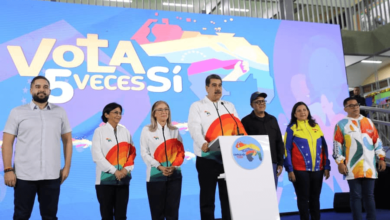Indigenous peoples of the Americas and progressives forces, including Venezuelan President Hugo Chávez, demanded and apology from Joseph Ratzinger, Pope Benedict XVI, the leader of the Catholic church, for racist, ahistorical comments during his recent visit to Latin America that denied the genocide caused by the and European conquest of the Americas.
“Christianity was not imposed by a foreign culture,” said Ratzinger in Aparecida, Brazil. He was ignoring the colonial
|
Under colonial rule, Indigenous and African beliefs were banned and people were forced to adhere to the domination of the church. It was not uncommon for priests to bless conquistadors before a massacre of Native peoples.
To add insult to injury, the Pope went on to say that Indigenous peoples wanted to be subjugated by the colonial powers: “Christ was the savior [that Indigenous people] silently yearned for.”
Venezuela’s Chávez responded, “There was a real genocide here and, if we were to deny it, we would be denying our very selves.”
Chávez’s comments were underscored by the resurgence of anti-imperialist sentiment throughout Latin America. This shift is reflected not only by socialist Cuba and revolutionary Venezuela, but is also evident in other recent Latin American electoral results such as Bolivia and Ecuador.
Because of widespread criticism, the Pope was forced to backtrack. In his weekly address, he said, “The memories of a glorious past cannot ignore the shadows that accompanied the process of evangelization of the Latin-American continent [sic]. … It is, in fact, not possible to forget the suffering [and] injustices inflicted by the colonizers against the indigenous population, whose human and fundamental rights have often been trampled.” He did not specifically apologize to Indigenous groups.
Moreover, the Pope has attacked those elements of the church that are allied with the overall anti-imperialist struggle.
The desire to break free of neoliberal domination has been supported for decades by the most progressive sectors of the Catholic church in Latin America, especially among adherents of liberation theology—a sect of the church that believes concerted action is necessary to win justice for the workers and oppressed. In many instances, Catholic priests and leaders have played important roles in liberation struggles, such as in Colombia, El Salvador and Nicaragua. They have worked alongside secular Marxist and progressive forces to win freedom for the oppressed.
A recent document signed by European clergy and supported by the Pope, called for the return to “the doctrine of the church.” It is an attempt to push back liberation theology proponents and their allies.
This attack is similar to the unfounded denunciation by the Pope of “authoritarian regimes” in Latin America. He is believed to have been referencing the governments of Cuba and Venezuela. But the Pope’s reactionary words cannot dampen the spirit or resolve of the struggling people of Latin America. They seek justice here and now.







